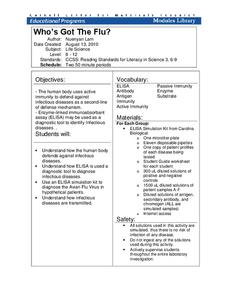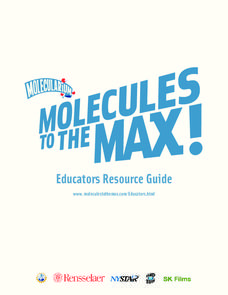Science Matters
Basic Needs
Scholars take part in a grand conversation about the basic needs of living things. Working collaboratively, pupils brainstorm and identify similarities to come to the conclusion that the environment meets the needs of all living things.
Science Matters
Formative Assessment #1
Discover how much your young scientists know about biotic and abiotic factors with a two-question formative assessment that requires them to observe, list, and describe.
Science Matters
Plot Study
Small groups investigate plots of land to discover how abiotic and biotic factors interact. After recording their findings, scholars share observations with peers and self-reflect on the learning process.
Science Matters
Ecosystem Pre-Assessment
Test scholars' knowledge of ecosystems with a 20-question pre-assessment. Assessment challenges learners to answer multiple choice questions, read diagrams, and complete charts.
DiscoverE
Ice Cream Special
We all scream for ice cream! Individuals create home-made ice cream in the classroom. This is a delicious way to show a real-world application of the freezing point depression to your class.
DiscoverE
Slime!!
Who's going to get slimed? Your entire class! Scholars create slime using Borax, water, and white glue. Some food coloring can give the slime a bit of color.
DiscoverE
Build a Plankton Net
Give household materials new life by turning them into a plankton net. Scholars design and build a net to collect and filter plankton from water. They test out their creations by using glitter to represent plankton. The nets need to...
DiscoverE
Heart Valve Replacement
Put your heart into it. Scholars design and build replacements for mitral heart valves. Obviously, they can't test their creations on a real heart, so a box with marbles (to represent blood cells) will suffice.
DiscoverE
Building with Biology
Seeing is believing! Bring DNA to life for young biologists using a simple extraction lab. Individuals extract the DNA from wheat germ, then place it in a microcentrifuge tube for observation. They thread yarn or other material through...
Cornell University
Celebrate Urban Birds
Set up a 50x50 square foot area in a space at school and choose three days to go outside and observe the birds seen in a 10 minute span. The activity has learners tapping into their observation skills and creates awareness of the birds...
Cornell Lab of Ornithology
Amazing Birds
What's so amazing about birds? Find out just how amazing birds are with a physics of animal behavior unit created by Cornell Lab of Ornithology. Have learners explore and tap into their observational skills and notice how birds fly, what...
Cornell University
The Making of Macromolecules
Compare and contrast macromolecules made from the same elements. Young scholars learn how the structure of a molecule has as much influence on a compound as the elements in the molecule. They experiment with molecular model kits to...
Cornell University
Who’s Got The Flu?
Become an immunologist for the day. Scholars elicit the use of the enzyme-linked immunoabsorbent assay (ELISA) to diagnose an infectious disease. Through the process, they learn about the immune system response to infectious diseases.
Curriculum Corner
Coniferous and Deciduous Trees
What are the differences between coniferous and deciduous trees? Supplement your tree lessons with a set of activities that has learners describing, naming, comparing, and reading about deciduous and coniferous trees. The activities are...
Beyond Benign
Punnett Square Possibilities
Discover possible genetic outcomes through Punnett Squares. Learners continue studying genetic traits in the 10th lesson in the 17-part series. After determining the father of Sparky's kittens, scholars now attempt to predict the traits...
Centers for Ocean Sciences
Ocean and Great Lakes Literacy: Principle 7
Your mission, should you choose to accept it, is to take your class on an underwater adventure. The final installment in a seven-part series involving salt and freshwater bodies takes junior oceanographers below the surface in...
Rensselaer Polytechnic Institute
Molecules to the Max!—Teacher's Discovery Guide
Molecules to the Max! refers to a movie released in 2009 about the world of atoms and molecules. A helpful discovery guide provides five posters on science topics typically covered at the middle school level. It also explains the...
Rensselaer Polytechnic Institute
Molecules to the Max!—Educators Resource Guide
From molecules to nanotubes, an engaging unit explores the world of tiny science. Fifteen hands-on experiments and lessons engage young scientists as they learn chemistry. Discussions, worksheets, and data analysis reinforce the concepts...
California Academy of Science
Using Empirical Data in the Classroom: Raptor Migrations!
Raptor flight patterns align with seasonal changes in net primary productivity. Here is a thought-provoking lesson that uses empirical data from a video to help scholars understand raptor migrations, producers/consumers, and ecosystems....
National Institute on Drug Abuse
The Brain's Response to Drugs
Marijuana affects the brain differently than inhalants, which have a different effect than opioids. Elementary and middle school classes read about these drugs as well as nicotine, methamphetamine, hallucinogens, and steroids before...
PBS
Stories of Painkiller Addiction: Commitment to Recovery
Recovery from substance addiction is an ongoing process. The final lesson plan in a series about painkiller abuse and addiction prompts learners to research various recovery options before writing a short story about a character who is...
PBS
Stories of Painkiller Addiction: Decisions and Consequences
Teach young learners that most drug addictions end in one of three outcomes: treatment, jail, or death. After watching a short video segment on the consequences of drug abuse, class members discuss what they viewed and consider what...
PBS
Stories of Painkiller Addiction: The Brain on Autopilot
For some people, the force of addiction can be as biologically compelling as the drive for food or water. High schoolers watch a video segment about Ryan, a recovering addict, and learn more about how opioids and other drugs can affect...
PBS
Stories of Painkiller Addiction: Prescription Drug Abuse Awareness Campaign
The I-STOP law was designed to regulate the distribution and tracking of prescription drugs. After reading an article about its signing and implementation, middle and high schoolers work together to come up with their own ideas for an...

























